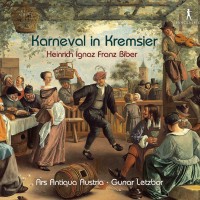Gunar Letzbor’s early Biber
|
Walt Mundkowsky [November 2013.] As with Charles Rosen’s Goldbergs last month, I’m happy to welcome this Biber program (inessential but lots of fun) back into circulation. (The Swiss Pan Classics label has reissued some Symphonía titles.)
“Karneval in Kremsier.” Heinrich I.F. BIBER: Trombet- undt Musicalischer taffeldienst à 4 (1673); Arien à 4; Harmonia Romana; Balletti (incl. Ciacona from Serenada à 5, “Der Nachtwächter”); Arien à 4; Balletti; Balletti Lamentabili à 4 (1670) (rec. 10/1995). Ars Antiqua Austria, Gunar Letzbor (vln & dir.). Pan Classics PC 10300 (http://www.panclassics.com/). Available from Nov. 25 via MDT (http://www.mdt.co.uk/). Long ago I bought every recording of Biber’s Rosenkranz-Sonaten that appeared, to spur others into action. Now there are close to 20 and I have three – Eduard Melkus’ 1967 and Reinhard Goebel’s 1990 (both Archiv), and Maya Homburger’s 2007 (Maya). Biber is better established, but this invigorating CD of dance items from his twenties creates the soundtrack for a carnival of the era and can’t hurt. Individual movements are brief (50 zip past in 75:01), and incorporate dizzying contrasts of color, speed and texture. Starting with trumpet fanfares shockingly transferred onto the violin, this sequence features proud melodic contours, the full range of dance forms (from flowing Sarabandes to sprightly Gavottes and Gigues), and stamping peasant rhythms. I’d hate to be without violist / basso Michael Oman’s majestic turn as a tipsy night watchman (Goebel’s version plays it straight). At the stroke of midnight, the celebration shifts to the exhausted gloom of the six-part Balletti Lamentabili. Ars Antiqua Austria clearly relishes and understands this intricate music – even early on it was core repertoire for them. Gunar Letzbor, their leader, spent time in Goebel’s MAK, and is equally attuned to Biber’s manic high spirits and solemn interludes. With delicious, lively sound, Karneval is a great (17th century) party album. Letzbor’s investigation of the period continues with Biber’s Fidicinium Sacro-Profanum (1683), underrepresented in the catalog. It hits the US market on January 14 – Challenge Classics CC 72575. See W.A. Grieve-Smith’s Rosenkranz-Sonaten survey and Mike’s Biber review.
[More Walt Mundkowsky]
[More
Biber]
[Previous Article:
Danses, Pièces et Suites. Pièces de Clavecin 7b.]
[Next Article:
Piano Factory 10.]
|
